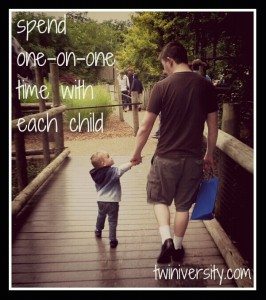Last updated on September 30th, 2021 at 10:19 am

“My husband is disheartened when he tries to take our twin ‘A’ for a one-on-one. Every time he returns from an outing with twin ‘A’ it’s a disaster. ‘A’ comes home sobbing; upset that he didn’t get to do “this” or “that” when they did a bunch of things that were fun! My husband says they have a good time until the answer is “No” to the added “wants” that go unfulfilled. When they get home all ‘A’ can tell me is all the things he didn’t “get” to do instead of being happy and telling me about the things he did do. I know it really makes his daddy sad since it is rare that they go out. He wants to build good positive memories with him but it always seems to “end badly”. Is this sort of behavior normal for a four year old? Is there anything we can do to make their next outing better?”
Have you ever been in this sort of situation? Have you jumped to the conclusion that your child is just being ungrateful? Well… that may not be the case. Consider some reasons WHY your child may be acting this way:
- The change of pace of having mommy or daddy all to themselves without their twin, other siblings and other parent around can be overwhelming.
- You may do things differently than your partner does when interacting with him and that can throw them off as they don’t know what to expect.
- They may start to break down when they realize that the outing is coming to a close and ask for “more” because they do not want the outing to end. (In reality they want more you time)
- It may be difficult for them to regulate their feelings in a proper way in new situations and experiences.
- Sugary of junk foods that you may have allowed them to have may have an adverse effect on their behavior.
- Some kids are naturally ‘glass half empty’ personality.
So what can you do to make the next outing better? Follow these guidelines
PLAN:
Have your child help plan their next outing. When they are younger you can give them multiple choice options “Do you want to go to the park or to the movie?” When they get older you can start asking them for ideas for outings that they would like to do. You may learn a lot about your children’s tastes when you do this. Then before you head out go over the itinerary with them so they know what to expect. It can be overwhelming to them to be surprised.
POSITIVE NO’S
If your child starts asking for this or that, instead of saying “NO!”, try saying something like this, “Wow, great idea! It’s not on our list for today, but let’s do that next time.” This will let your child know that you are considering their thoughts and it will help to avoid the negative feelings that stem from hearing “NO!”
REMINISCE:
When the outing is coming to a close, talk positively about the things you did. On the drive back home ask them what their favorite part was and what they would like to do again. Tell them about your favorite part of the outing and how much you enjoyed their company.
-Find out what other parents have said on this subject:
“When I’ve taken kids to the zoo and they want a “treat” or toy from the gift shop I remind them that the treat was going to the zoo.” – Anna
“Don’t set them up for failure. My husband one stopped in the video game store while on an outing to get a remote so the boys could play a game together. My son overreacted because they did not leave with a game! In his mind daddy was going there to get a game for him. He kind of set him up to fail on that one!” – Marie
I’m in college development psychology and at that age that behavior is very normal. They are in a mindset of just them. That is why it is hard for kids that age to share and have reasoning skills. It’s perfectly normal. Their brain has not developed yet for these concepts until around 6 years of age. You might try this: next time have your child and husband bring something home with them, something that is exciting to your son. It could be a rock, library books, leaves, acorns, there are a lot of free stuff out there. When they get home act very interested in what they brought home with daddy. – Terri
___
Tags: Twins, triplets, multiples, twin tips, twiniversity, one on one time with twins, helping children be grateful, dates, outings, going out,






